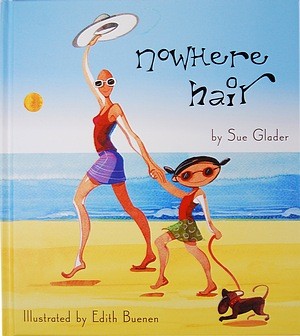Since I’m focused on writing about kids right now (working on a couple of other posts right now), I thought I’d repost a (reader favorite) entry that I did on a super book called Nowhere Hair.

In a whimsical yet normalizing way, this book addresses key (absolutely fundamental!) points when talking with children about cancer, including:
- Cancer is not their fault
- Cancer is not contagious
- Dramatic side effects of chemotherapy, including hair loss and fatigue
In my work as a hospice and palliative care nurse, using books (a/k/a bibliotherapy) is a wonderful way to open dialogue to explain and discuss challenging circumstances to children (including things other than FBC!).
This book addresses children’s guilt, fear and sadness gently, with dignity and respect. This book is honest, fun and hip…and I’m crazy about it!
The author, Sue Glader, is an award-winning freelance writer, mother, and breast cancer survivor living in Mill Valley, California. She encourages women to squeeze life, be brave, and take risks. So cool. While I was living in San Francisco, I had the opportunity to spend time with her. And can I just say that she is the real deal?
The illustrations by Edith Buenen are engaging, chic and joyous. They help minimize potential fear related to hair loss.
Thanks to my professional and now personal experiences, I’ve read every piece of children’s literature related to cancer. As a consequence, I have to admit that I’m a tad bit of a (ok, full blown) book snob on the subject. Let’s just say that I can’t recommend this book highly enough.
Please remember that information is best delivered to children (and adults for that matter!) in small doses. Not everyone diagnosed with breast cancer receives chemotherapy. Therefore, I would recommend that this book be introduced to a child only when it is confirmed that a person will receive chemotherapy (or has some other reason for hair loss, e.g., alopecia).
If you or a friend has to receive chemotherapy, first of all, big F-bomb bummer. Secondly, in Nowhere Hair, you have a great tool to help guide children through the experience (SL).
Good children’s literature appeals not only to the child in the adult, but to the adult in the child.
– Anonymous

